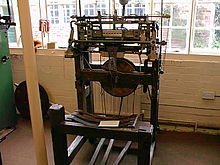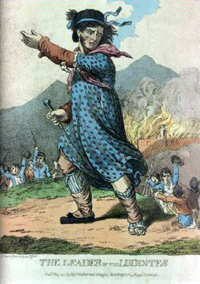Luddites - Rage Against The Machine
Technology has not always been as acceptable as it seemingly is today. So many of us want the latest gadgets and the new toys that will somehow improve our lives, make things go faster or supply us with the latest eye candy. We upgrade our technology on a regular basis and for many technology fills our lives at home, away from home and even between the two. So let's step back to the early 19th century and see what was going on then, to 1811 to be more precise and the emergence of the Luddites.
We are talking of the period of the Industrial Revolution in England. Stocking frames and power looms don't seem too disconcerting to us today but it was the intrinsic labour saving value of these devices that turned many against them. In short; the use of machinery meant companies could replace well paid artisans with low wage, less skilled labour. Jobs were lost and that is never a thing that goes down too well.

Stocking frames were machines that could do the job of a hand knitter and were invented by William Lee an English clergyman and inventor from Calverton near Nottingham far back in 1589. The industry took nearly a century to develop, not least because Queen Elizabeth I refused him a patent as she feared of it's effects on the traditional hand knitting industries.
The Luddites were not opposed to technology or bad at using it though. Previously the craftsmen and craftswomen such as the knitters could work their own hours, free of restriction, so long as they delivered on time. Automation meant being tied to regular hours in a factory. Thus they were unhappy about the resultant loss of their way of life and the fact they they would most likely have to follow suit and accept lower wages or worse, lose their jobs entirely.
They were also concerned about the quality of the material and indeed it took a long time for the inventors to improve their machinery. Artisans were upset at their loss of dignity, of their reduced esteem and of their reduction in status to mere factory hands.

The name 'Luddite' may have been named after one Ned Ludd who allegedly ruined a stocking frame in 1779 in a fit of rage after being told he was knitting too loosely. Despite this tale there is no solid proof of his existence. However this did likely lead to the creation of King or General Ludd, the folkloric leader of the Luddites.
King Ludd first 'appeared' in November 1811 at a Nottingham protest and then on to further protests. The government were at great pains to find him but despite supposed sightings they never did - probably because he did not exist.
Excerpt from General Ludd's Triumph...
Chant no more your old rhymes about bold Robin Hood,
His feats I but little admire
I will sing the Achievements of General
Now the Hero of Nottinghamshire
Brave Ludd was to measures of violence unused
Till his sufferings became so severe
That at last to defend his own Interest he
And for the great work did prepare
The Luddites were not particularly well organised, some factories were set ablaze but mostly they destroyed machinery. Although destruction of machinery was a criminal offence that led to penal transportation; the authorities did not feel this was enough of a deterrent against the continued trouble and so the Frame Breaking Act of 1812 allowed the death penalty to be passed. Lord Byron, a strong supporter of social reform, came to their defence. He opposed the death penalty and in his first speech before the Lords was very sarcastic about the so called benefits of automation.
Song for the Luddites by Lord Byron
As the Liberty boys o'er the sea
Bought their freedom, and cheaply, with blood,
So we, boys, we
Will die fighting, or live free,
And down with all kings but King Ludd!
When the web that we weave is complete,
And the shuttle exchanged for the sword,
We will fling the winding-sheet
O'er the despot at our feet,
And dye it deep in the gore he has pour'd.
Though black as his heart its hue,
Since his veins are corrupted to mud,
Yet this is the dew
Which the tree shall renew
Of Liberty, planted by Ludd!
The Luddites would meet on the moors surrounding the large industrial towns, mainly in Nottinghamshire, Lancashire and Yorkshire. They even engaged the British Army as well as send death threats to magistrates and others. But by 1817 it is considered that the life of the Luddites was over and time lurched on to new troubles and tribulations.
Of course during the Industrial Revolution many people would have been worried about being replaced by machines and that is still true today. The Luddites were simply fighting to keep their way of life. Perhaps it is wise to think once in a while if all our modern technology is enhancing our lives so well after all.
![]()
| Requirements for functional equivalence to conscious processing? by DaltonG (General AI Discussion) |
| Will LLMs ever learn what is ... is? by HS (Future of AI) |
| Who's the AI? by frankinstien (Future of AI) |
| Project Acuitas by WriterOfMinds (General Project Discussion) |
| Ai improving AI by infurl (AI Programming) |
| Atronach's Eye by WriterOfMinds (Home Made Robots) |
| Running local AI models by spydaz (AI Programming) |
| Hi IM BAA---AAACK!! by MagnusWootton (Home Made Robots) |
| LLaMA2 Meta's chatbot released by spydaz (AI News ) |
| ollama and llama3 by spydaz (AI News ) |
| AI controlled F-16, for real! by frankinstien (AI News ) |
| Open AI GPT-4o - audio, vision, text combined reasoning by MikeB (AI News ) |
| OpenAI Speech-to-Speech Reasoning Demo by MikeB (AI News ) |
| Say good-bye to GPUs... by MikeB (AI News ) |
| Google Bard report by ivan.moony (AI News ) |
| Elon Musk's xAI Grok Chatbot by MikeB (AI News ) |
Most Online Today: 453. Most Online Ever: 2369 (November 21, 2020, 04:08:13 pm)
